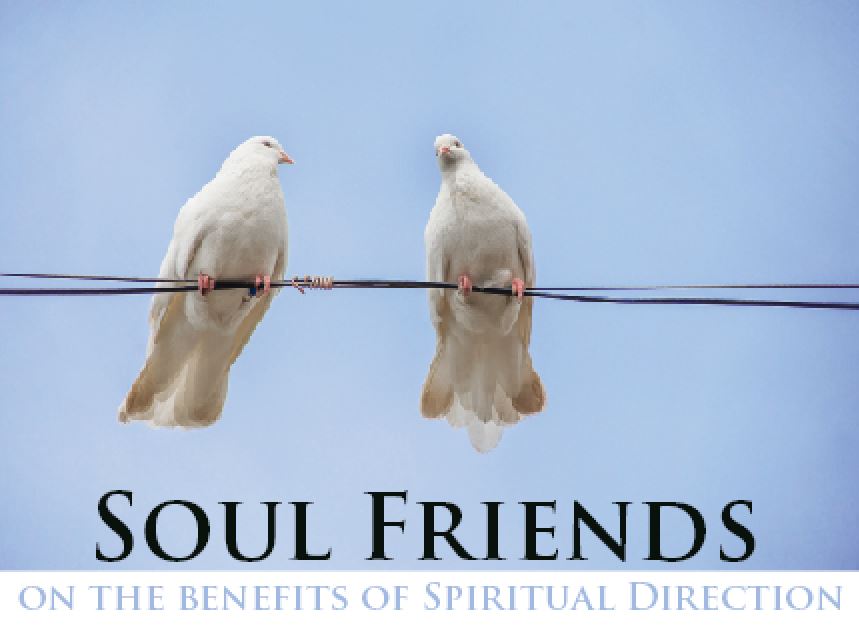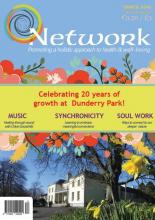Soul Friends - on the benefits of Spiritual Direction

In 2003, I had just finished up an arduous doctoral degree and moved eight hundred miles north from the San Francisco bay area where we were attending graduate school to Seattle in the Pacific Northwest United States. My husband and I were both starting new teaching positions and were full of hope about our new life.
Two months after we moved, my mother became ill very suddenly with a serious infection and after five days of sitting vigil with her in the ICU, she died. I am an only child and was very close to my mother. The experience ushered me into a long season of terrible grief.
I was filled with doubts about my work, about how to move forward, what was meaningful, even about the nature of God. Eventually I found myself in the office of a spiritual director, who was also trained as a Jungian analyst. He listened patiently to me through all of my tears, held space for my experience in a loving way, witnessed what was happening, and offered wise insight.
It was the beginning of a long-term relationship. Many years later I still meet with this same spiritual director. I thought when I moved from the U.S. to Ireland four years ago I would find someone new here, but I discovered in those early days in a new culture, I really wanted someone in my life who already knew my story well. Thanks to the gifts of technology we are able to continue this support across the distance.
Celtic and Monastic Roots
Spiritual direction is the ancient practice of having a soul friend, or anamchara in the Irish language, and was a practice emphasized by the desert and Celtic monks. Sometimes called spiritual guidance or companionship, it is a relationship of conversation and listening between a seeker and a guide, of sharing sacred stories.
In the ancient Celtic pre-Christian tradition of Ireland, the druids were the ones who underwent lengthy apprenticeships to be shaped into the role of wise guide and spiritual mentor to others. We have stories of deep and abiding friendships and know that stories were held as sacred. The world was believed to be both the seen and unseen dimensions, that we are surrounded by spiritual presences, from the fairy folks to the gods to the ancestors.
The Celtic tradition also has a reverence for triads. In the soul friend and seeker relationship there is also a third presence of the divine or the ground of being, however one understands that sacred presence to exist.
When monasticism developed in Ireland, because of the earlier leadership of druids, the monks valued anyone who acted as spiritual teacher, guide, or mentor. The Irish monks were also heavily influenced by the early desert tradition which blossomed in Egypt and Syria, their writings were full of emphasis on the value of having a friend and confidante in the spiritual life, which was as important as the solitude they also sought so vigorously.
There is a story about St. Brigid where she says, “anyone without a soul friend is like a body without a head, is like the water of a polluted lake.” Her words might ring harshly, but serve to emphasize how important this concept was to the early monks. Soul friends were considered to be critical to our growth and spiritual development. St. Patrick was known to have a long relationship with a spirit guide beyond the veil names Victor.
This companionship was deemed essential in the spiritual journey. A soul friend was many things: wisdom guide, midwife, mentor, witness.
Shadow Work
We all have blind spots about ourselves and our motivations. We may be prone to ‘spiritual bypassing’ and make every effort to stay ‘positive’ and avoid our more difficult feelings. A soul friend is someone with whom we can be honest and share our deepest desires. They in turn can help to reflect back what they see – the ways we stand in our own way, or sabotage our best efforts at living more fully.
The Irish poet Patrick Kavanagh described the ’secret room in the heart’. We invite a soul friend into this place, which not many others see. They are privy to our places of vulnerability and longing. And in the process intimacy deepens. As they begin to see the whole of us, the difficult parts as well as the luminous ones, we also begin to welcome those places within ourselves. Spiritual direction creates a space of radical hospitality where we gradually learn to love all the visitors who show up within us.
Sharing night dreams can be an important aspect of these conversations. Dreams reveal our shadow places as well as our soul’s deep desires. From a Jungian perspective we each have a shadow, which holds all the unconscious, unclaimed, and rejected aspects of ourselves. The journey toward wholeness is illuminating the shadow and embracing those parts as best we can.
Imagine having someone in your life whose focus for a period of time is to listen to you, to receive your unfolding story, and reflect it back to you in new ways. Imagine a companion to really listen and hear the subtext under what you are sharing, the pauses that reveal, and is not trying to formulate their own story in response. Imagine someone who knows your coping mechanisms and strategies in life and can help you to gently release them in service of more vibrant ways of being.
Seasons of Discernment
Perhaps the most common time to seek out a soul friend is during a threshold season of your life. Discerning a new path for work, receiving a medical diagnosis, experiencing the loss of a loved one, these are all times when we are thrust into a doorway. Rather than deny the experience and numb ourselves out, the process of spiritual direction invites us to reflect on how our lives do or do not feel meaningful and what we might do to move toward greater life.
A soul friend can also be invaluable in helping us to discern what spiritual practices we might want to take on. In the spiritual marketplace, it is easy to be overwhelmed by an abundance of books to read, types of meditation, retreat opportunities, and more. In spiritual direction, you can listen for what would be most nourishing to your soul and make a commitment to greater depth of practice, sharing the fruits at your next session.
Perhaps your life feels too full and busy and you aren’t sure how you ended up so stretched thin, and a soul friend can offer you tools of ancient practices to ground you in a soulful and life-giving rhythm. They can also invite you into quiet spaces during the session to listen for what the deeper longings are that want to emerge. What might you be crowding out?
Spiritual Direction in the Modern World
The era we are living in is ripe for a renewal of this ancient tradition with so much confusion and choices abounding, while also having to live knowing the devastation being unleashed on our planet and on one another. We need safe spaces to share our grief over what is happening, our sense of helplessness, and someone who can help us to discover the divine spark within that might just have something to offer during these growing crises.
We live in lonely times, when communities have broken down, and many do not find solace in traditional settings of church. Or we may be too busy to make genuine connections with people and spiritual direction offer a place of feeling seen and heard.
A session might open with a poem or some quiet, the time might include conversation, reflection, working with dreams, journaling, even time for creative art that supports what you are experiencing, or a walk together surrounded by trees or along the shore. Each spiritual guide has a different approach, and finding the right fit is an important task.
We can also find soul friends in ancestors who are allies to us and offer ongoing support through the veil. Sometimes a companion animal offers its own kind of wisdom for living. Or perhaps a friend we already have, with whom we can really be our most honest selves.
How does one become a soul friend or spiritual director?
In general, it is considered that one has a charism or gift already for this kind of presence but there are programs which help one to develop this gift. Integral as well to the training is learning ethics and healthy boundaries, when to refer someone for psychological counseling, self-care, and commitment to one’s own spiritual direction and supervision. Most spiritual directors are also involved in other kinds of work such as retreat facilitation, ritual leadership, and writing. Sometimes a therapist can fill this role of soul friend.
Usually there is a fee involved, which is a kind of energy exchange. Often the income goes to support their own ongoing continuing education and supervision, their office space, as well as the needs of daily life. You offer payment so that the spiritual director can focus their attention entirely on your needs for the time of the session and there is no ambiguity about what is being exchanged for their time.
Christine Valters Paintner, PhD, REACE is the founder of AbbeyoftheArts.com, an online monastery integrating contemplative practice and creative expression. She is the author of nine books on spirituality and art and leads pilgrimages and retreats. Christine offer both spiritual direction/soul friendship and supervision rooted in contemplative tradition integrated with the gifts of expressive arts for discovery and ecological honoring and awareness. She lives in Galway City with her husband of twenty-two years.
Latest Issue
Upcoming Events
-
17/04/2020 to 26/04/2020
-
18/04/2020
-
23/04/2020
-
15/05/2020 to 23/05/2020
-
16/05/2020 to 17/05/2020
Recent Articles
Article Archive
- November 2011 (2)
- January 2012 (3)
- February 2012 (2)
- March 2012 (2)
- April 2012 (4)
- May 2012 (4)
- June 2012 (1)
- July 2012 (3)
- August 2012 (2)
- October 2012 (2)

